Loving the One You’re Quarantined With
An alumna ponders her new socially distant life.
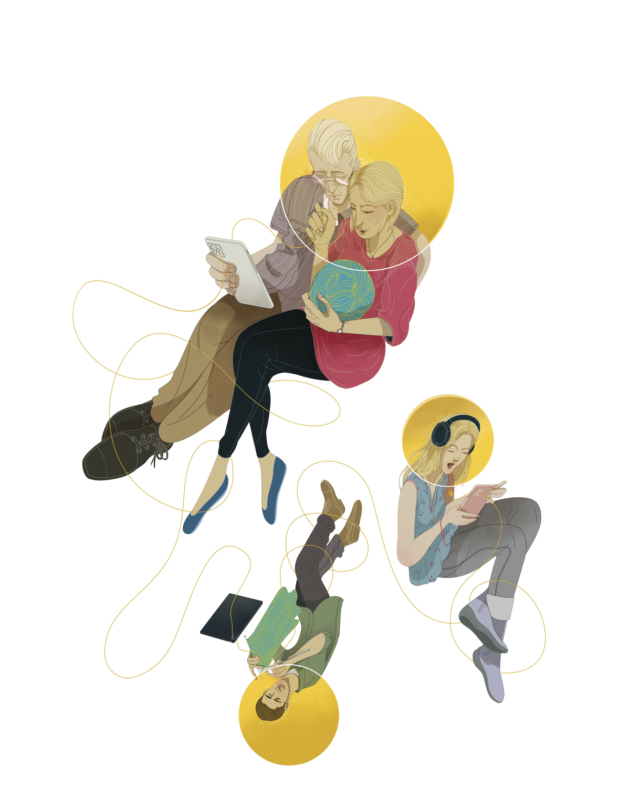
My husband, James Pennebaker, PhD ’77, is an academic psychologist and researcher at UT Austin who studies emotional and physical responses to disasters. When a volcano blows, the earth shakes, or the levees break, he bursts into action.
In the days and weeks after 9/11, he went into a work frenzy, commandeering the computer and the phone, directing his research team and collaborating with colleagues around the world. In theory, I knew he was at home, since large pots of coffee kept disappearing, but I didn’t see him for hours at a time. I finally threatened to set his computer on fire if he didn’t walk away from it and talk to me about whether the world was ending.
Eighteen years later, we are facing a new and different disaster, but we are basically the same people we were in 2001: I still want to connect with others and he still wants to lose himself in his work. When I can finally get him to talk, he usually admits I’m right; it does make him feel better. But getting him there will always be a marital tug-of-war.
As I like to tell people, “My husband studies emotions. I have emotions.”
Just about everything about this pandemic makes my mind want to explode—how much worse will it get? How long will it last? How can we begin to comprehend the suffering around us and around the world? And what can we do to help?
COVID-19 is invisible, random, and elusive, and we’ve never faced an adversary quite like it. As I write this in late May, we are still learning more about it—week to week, day to day—but we still don’t know enough.
Even the most basic facts we do know about the virus are mind-bludgeoning. First, those of us on the sidelines do the most good by shutting ourselves away and doing nothing. Second, other people—including those we love the most—have become a potential danger to us. Finally, we are all interdependent; our actions affect others’ safety and their actions affect us.
I know these facts. We all do. But truly comprehending them in my gut and my heart is something else.
***
My husband and I used to travel a fair amount. The last trip we took was at the end of February, when we flew from Austin to Chicago to see our son Nick, his wife, and their newborn baby daughter. Since it was also my husband’s 70th birthday, our daughter Teal left her family—her husband, 4-year-old daughter, and 2-year-old son—at home in Seattle to join us.
We haven’t seen our kids and their families since then and I don’t know when we’ll be able to see them again. I try not to think about that because it upsets me too much. Even though my husband and I live thousands of miles from our children, we are close. We visit one another frequently, talk on FaceTime, and exchange emails. I like to think we are good at being the parents of two adult children.
We try not to give them too much advice about their lives. But it’s nice to reassure them, from time to time, that their father and I have lived through hard times: deaths of loved ones, cancer, job loss, painful disappointments. We survived and they will too.
But a pandemic! Potential economic catastrophe! Crippling worldwide uncertainty! What do we know about that?
“I wish I knew you what to tell you,” I’ve told both our daughter and son more than once. “But I don’t. Your father and I have never been through anything like this.”
At our age, my husband and I have fewer responsibilities. We can both work from home fairly easily, order groceries online, host dinner and cocktail parties on Zoom. In many ways, our lives haven’t changed that drastically. It’s our grown children who are in the midst of this crisis, working full time in communications and marketing, rearing children, making decisions for their young families. We try to reassure them. We try to reassure ourselves.
It’s funny: You never outgrow wanting to protect your own children no matter how old they are. This has to be one of humanity’s most powerful instincts.
***
My daughter and I have been sending long emails to each other just to share how we’re doing, what we are feeling, thinking, fearing, and what we can still laugh at. It’s a way of comforting ourselves and feeling closer.
Some days, we write torrents of words to each other. We speak of our cracked-open hearts, our inadequacies, our paralyzing fears, our irritations, our doubts.
On other, better days, I write to her about my strange contentment with the contained, orderly lives my husband and I are now leading—how we work, cook, talk, read, and watch TV. He cooks and I clean up, which is the way we’ve always done things. Sometimes, we order takeout because we get tired of home cooking and because we want to support local businesses.
Our daughter writes to me about the puppet show her two children put on one afternoon and how her daughter Ellie has learned to ride a bike without training wheels. She sends us a video of Ellie, wobbly at first, then gaining confidence and balance. Careening closer to the camera on her two wheels, Ellie’s face erupts in pure joy and triumph as her parents scream happily in the background. (My husband and I watch this video roughly 300 times. Then we watch it again. It’s as close as we will get to being with her right now.)
“Will we be changed forever as we stay at home more and travel less?” my daughter and I ask each other. We don’t know. Then, as we always try to, we remind ourselves of how privileged we are. We can work from home. There are so many people who work in health care, transportation, grocery stores, sanitation, and other vital occupations who are risking their lives for the rest of us. And millions of others have already lost their jobs; over 100,000 have lost their lives or loved ones.
How do you stay at home and try to lead a smaller life without closing your mind and heart to the outside world? We can’t let ourselves do that, my daughter and I keep telling each other.
***
I’m ashamed to admit it, but my husband and I have been watching the Netflix reality show Love Is Blind.
The series brings singles together, all straight, good-looking, in their 20s and 30s. They proceed to “date” one another, each alone in a pod and speaking to their date through a wall. The conversations are like every horrible first date you ever had that made you swear you were going to join a convent as soon as possible.
We watched as the couples whispered secrets to each other through the walls. We kept watching as they professed love and as some proposed marriage. My husband complained about the superficiality of the series, but it was too late. I was hooked. We kept watching.
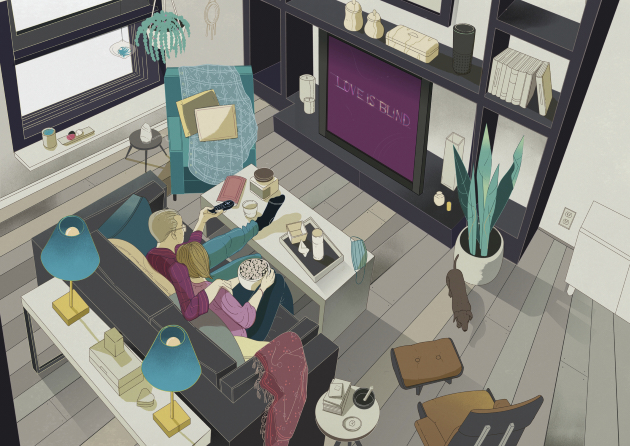
The newly engaged couples jetted off to a swanky resort in Mexico, where some stayed in love and others blew up. Sure, you could fall in love (or something like it) with someone you’d never seen—but you could also fall out of love (or like or infatuation) just as quickly.
By the fourth or fifth episode, my husband agreed with me: This was compelling television, reminding viewers how much we all wanted to be loved, how desperate any of us could be, how beautiful masks could shatter and fall away.
On the other hand, the backdrop of our real lives helped. As we watched Love is Blind, the world seemed to be splintering. One afternoon, a man across the street from our balcony howled, “I’m all alone! Help me!” and I froze and cowered like one of Kitty Genovese’s neighbors. All my pretty notions of who I was or who I could hope to be had withered as I shrank with fear. (What happened to him? I’ll never know.) But this show was my escape.
We weren’t watching to see whether love is blind; we knew it wasn’t. We were watching to see if it could still flourish. The world around us was falling apart, but we were sitting there stubbornly, watching and hoping for a miracle, rooting for love.
***
One afternoon, my husband and I drove through empty streets that reminded me of the slower, sleepier town Austin used to be when we moved here as graduate students in 1973. As someone who grew up in barren West Texas towns, I loved Austin—with its hills and lakes and trees and liberals—the instant I saw it. Everybody complains now about the gentrification, the price of real estate, the traffic in Austin, but I can’t help myself. I still love the place.
One institution that still remains from our early days here is the Texas Chili Parlor. It’s not what you would call health-conscious, but who cares? I was feeling nostalgic that afternoon, so we called in an order.
On this beautiful spring day, there was no reason to hurry. We passed slowly through the quiet streets, driving close to the gleaming dome of the state capitol. The Texas Chili Parlor is only a few blocks away, a battered dive we have been going to more than 40 years.
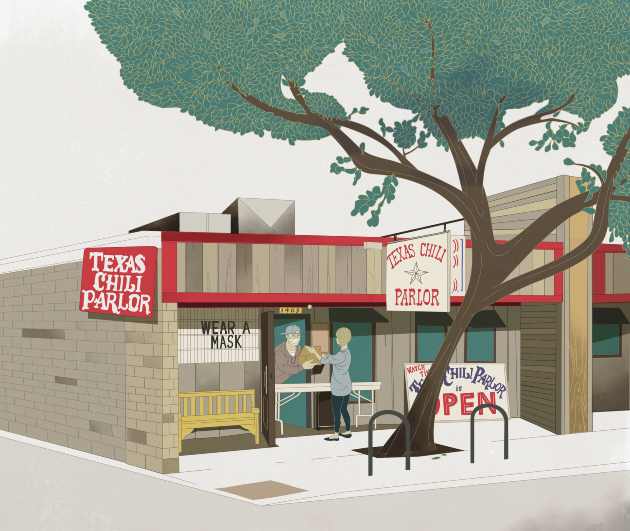
“Remember the fight?” my husband said—and of course, I did. Once, in the 1970s, while we were sitting at the Chili Parlor bar, a drunk on the stool next to me got loud and obnoxious. Someone behind the counter suggested he shut up. He didn’t. He kept yelling and spilling his beer. After a few minutes, a dishwasher dressed in a white apron came out of the kitchen and slugged the guy in the face.
“Why’d you do that, man?” the drunk said, patting his bleeding nose.
“I told you to shut up,” the dishwasher said over his shoulder. “You just didn’t listen.”
“You just didn’t listen!” That’s the kind of wild place where we used to live when we were young. All these years later, in the middle of a pandemic, only the cook and a couple of silent customers were at the Texas Chili Parlor, my husband reported when he came back with our order. No drunks, no fisticuffs, just our memories.
***
“I really believe everything is going to be all right,” my husband told me one hard night, when I was in despair. He said this with such confidence that I could almost breathe it in and feel it myself—the way his optimism and buoyancy have always comforted me.
Well, almost always. Like any quality you love most about another person, it’s also what drives you crazy about them. But that bleak night, it was exactly what I needed. I realized, again, how lucky I have been with him.
Illustrations by Marcos Chin

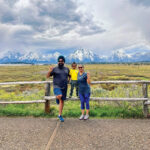


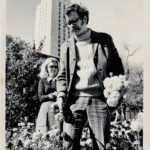












No comments
Be the first one to leave a comment.